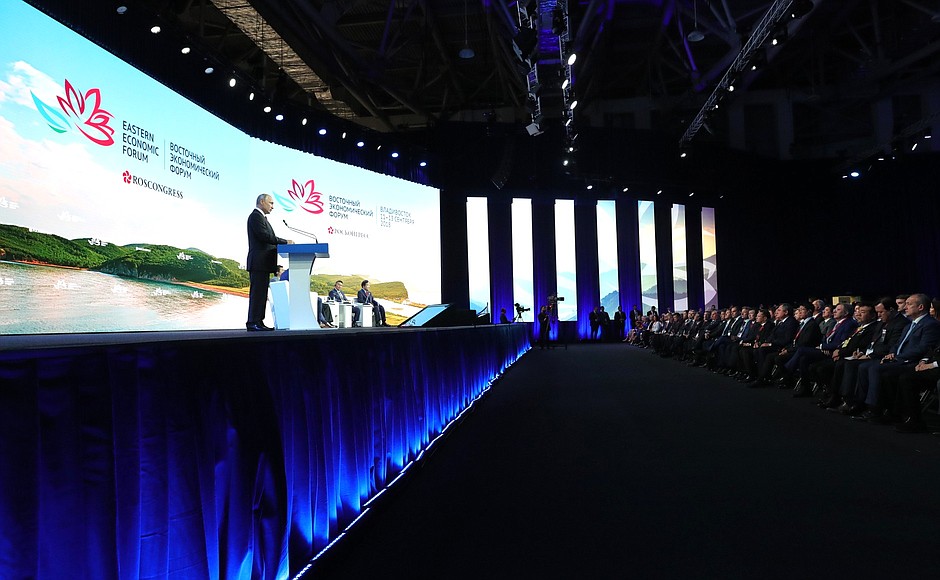
* * *
Excerpts from transcript of the plenary session of the Eastern Economic Forum
President of Russia Vladimir Putin: Colleagues, Mr President of the People’s Republic of China, Mr President of Mongolia, prime ministers of Japan and South Korea, ladies and gentlemen, friends,
I would like to welcome you all to the 4th Eastern Economic Forum. It is a pleasure to host the heads of major states in the Asia-Pacific Region, the heads of global corporations, and acclaimed international experts in politics, the economy, science, culture and the environment.
This year, the forum brought together guests from over 60 countries. Representatives of over a thousand Russian and foreign companies are working at the forum. Each and every partner is important and valuable to us. First and foremost, I would like to wish you every success in promoting business initiatives.
I expect that the meetings in Vladivostok will become a good opportunity for establishing reliable business links and productive cooperation across the Russian regions and primarily in the Far East. It is for the development of the Far Eastern economy that we organised this forum.
Developing the Far East is an absolute priority for us. I would like to repeat that this is a consistent and long-term policy. We are working hard to create a strong centre of international cooperation and integration, business and investment activity, education, science and culture in the dynamically growing Asia-Pacific Region. We are building this centre primarily in the interests of Russian citizens, the residents of the Far East, for their wellbeing, as well as for people to fully realise their potential.
We can see powerful resources for achieving the strategic goals that we set, for a breakthrough, for greater competitiveness of the country and a better quality of life for our citizens.
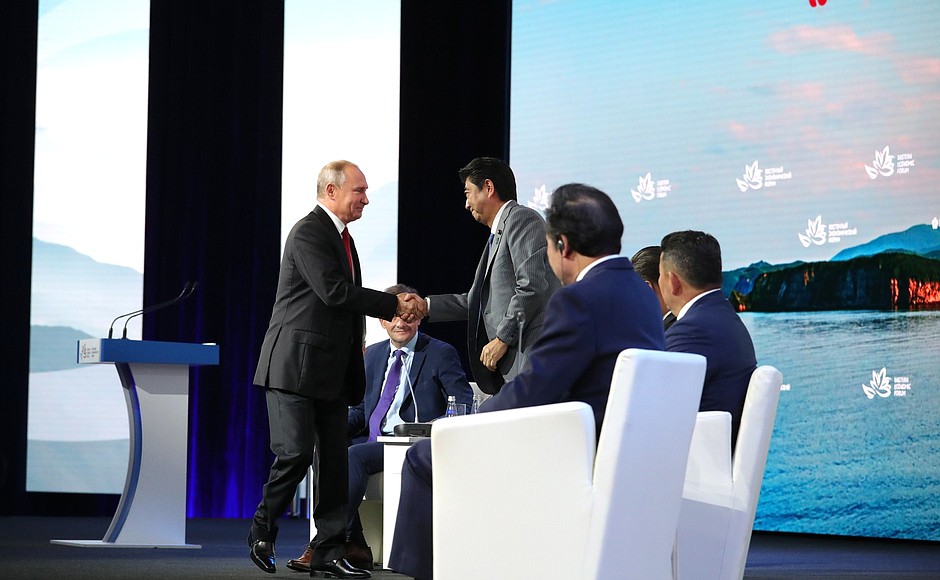
We understand how complicated the challenges are. We know that it is impossible to immediately solve all the demographic and social, economic and infrastructural problems of the Far East. But we have to do it, we will do it and will eventually succeed.
Modern models of cooperation with businesses and a priority statecraft approach towards the development of the Far East are already yielding results. The Far East is becoming a growth point and continues to attract investment. And I am confident that the new role of the Far East as the driving force of the national economy, innovations and culture will continue to expand in the years to come.
In the past five years, from 2013 until 2017, the region’s industrial output soared by almost 22 percent, considerably exceeding the average national levels. Today, the region accounts for over 25 percent of all direct foreign investment in Russia. This is quite impressive considering that this share totaled only about two percent five years ago.
Over 130 companies have been established, and over 16,000 new jobs have been created in line with special mechanisms for developing the Far East and the free port of Vladivostok. We are posting obvious development in such sectors as manufacturing construction materials, the transport infrastructure, engineering, tourism, production of minerals, the development of marine biological resources as well as the agro-industrial sector.
I would like to point out that we are witnessing a substantial increase in agricultural-project investment here in the Far East. It is necessary to support such investment, including the incentives for reclaiming disused plots of land and other areas subject to various sorts of restrictions.
Yesterday, I met with our colleagues from foreign companies and investors who are directly interested in this work in terms of the various competitive advantages that I have just been mentioning, including those in the field of agriculture.
In this connection, I would like to ask the Government and the governors of Russian regions to directly address this matter and to assess the use of farmland in each specific region.
And, of course, we need to more actively export Far Eastern farming produce to foreign markets, including the Asia Pacific region. In this connection, we are suggesting that our Chinese, Japanese and Korean friends and other partners whose businesses are proactively investing in the Far Eastern agricultural sector jointly eliminate food-trade barriers and reach optimal solutions for our common good.
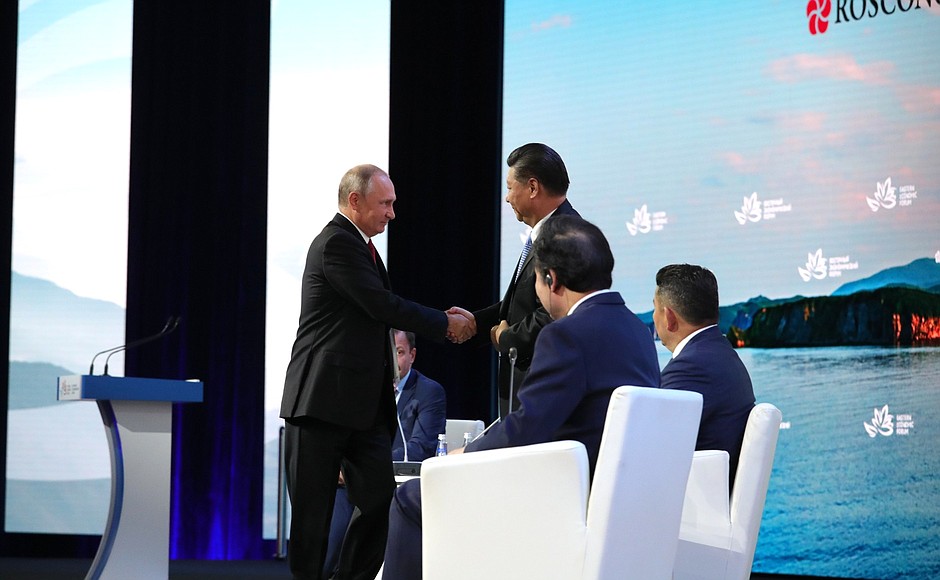
We realise the importance of phyto-sanitary oversight, and there are many spheres here where we can work together, all the more so as we are establishing companies and absolutely “clean” territories for joint work in the Far East.
Russia is proactive in promoting cooperation and investment ties with the People’s Republic of China. Today, more than 30 projects worth some 200 billion rubles are being implemented in Russia’s Far East, with the help of Chinese investors.
We are committed to promoting a positive cooperation agenda with our Japanese partners. Only yesterday, Prime Minister Shinzo Abe and I launched an engine plant in Primorye Territory. We will always support substantive, result-driven joint undertakings of this kind.
There is also great potential for promoting projects with Mongolia, our long-standing and reliable partner, on infrastructure, energy, as well as the environment.
Companies from the Republic of Korea are successfully carrying out their projects in Russia. It is in the regions of Russia’s Far East that cooperation with South Korean businesses is especially promising.
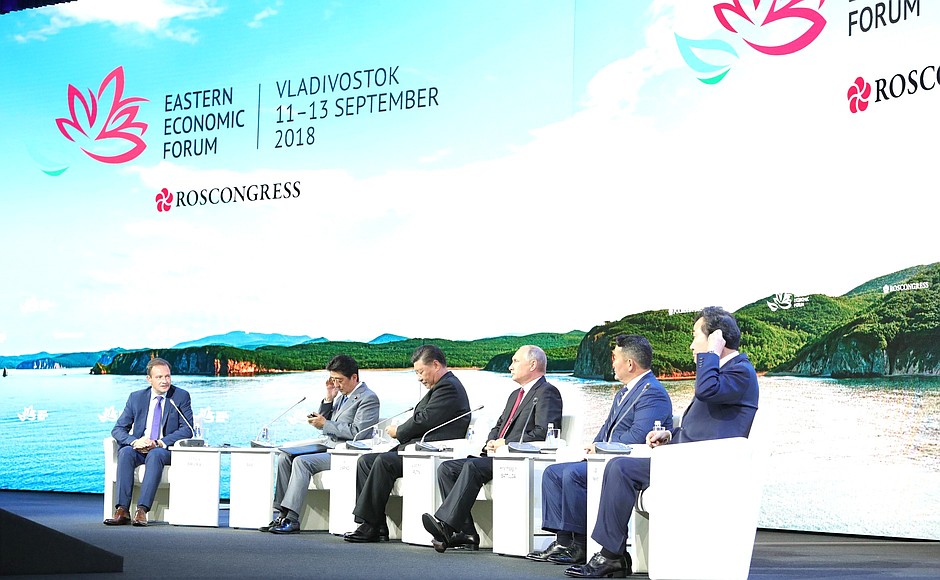
Of course, I cannot fail but to highlight once again trilateral projects in infrastructure, energy and other spheres involving Russia, the Republic of Korea and the Democratic People’s Republic of Korea. Normalising the situation around the Korean Peninsula is a key prerequisite for achieving progress on these projects.
All in all, in order to ensure steady development, we need stability, peace and security in the Asia-Pacific Region. It is essential that we prevent new conflicts from emerging and resolve old ones in the spirit of dialogue. Russia has always stood for this approach and promoted a constructive agenda on all international platforms, and is committed to doing so in the future. The same applies to our interaction with our partners within the Shanghai Cooperation Organisation, APEC, ASEAN, and other regional frameworks.
There is one more thing I would like to add. As I have already said, new forms of protectionism and various barriers have emerged across the world, affecting the global economy. They are becoming increasingly more apparent and are gaining momentum.
It is unfortunate that fundamental principles of trade, competition and mutual benefit are depreciated, falling hostage to ideology-driven approaches and short-sighted political calculations. This is a serious challenge for the global economy, especially for the vibrant APR, threatening its leadership.
We strongly believe that in order for our region to achieve high growth rates and remain a key force in international economics and trade, it needs to preserve the spirit of economic freedom and facilitate business initiatives free of sanctions, bans or political bias.
As we invite foreign partners to take part in joint projects in the Far East, we are acting in line with pragmatism, common sense and mutual benefit. We want investors vying for an opportunity to implement their projects in the Russian Far East to expand their fair competition, so that the best business proposals would win, yielding high profits, which are the main goal of any business.
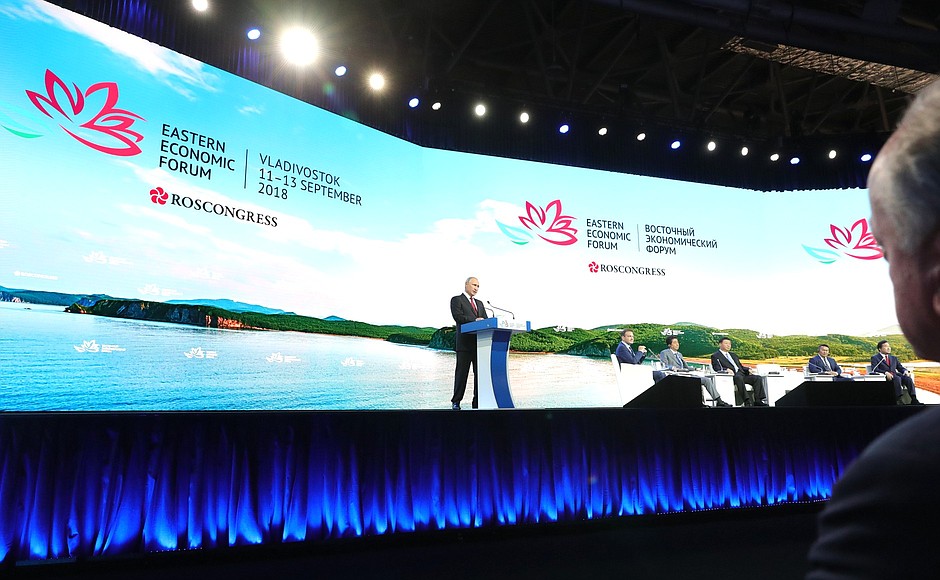
Just look: companies from Kazakhstan, India, Vietnam, Australia, New Zealand, as well as many other countries, which are quite different in terms of their interests, traditions, culture, political systems, international obligations and priorities, already operate in this Russian region. But I repeat, we are providing all entrepreneurs with equal conditions for successful and effective work.
Our decision to introduce electronic entry visas for people going to the Far East meets the spirit of development and openness. Today, people from 18 countries can obtain such visas; they can submit all documents online and under a simplified procedure. We will continue to work on this in the future, so that more and more people will be able to obtain online visas, and this also concerns Asia Pacific countries.
Friends,
I have already said that the scale of the tasks facing us requires systematic work for decades to come. I believe that we need a national programme for the development of the Russian Far East until 2025 and up to 2035.
The Government will be instructed to draft this document in close contact with the Far Eastern regions, citizens, businesses, public and business associations. Considering the significance of this national programme, it will be approved by a presidential executive order.
The programme should bring together and integrate the activities of our national projects and state programmes, long-term departmental plans of agencies and infrastructure companies, and the development strategies of all Far Eastern regions.
It goes without saying that this national programme should contain detailed and specific dimensions together with measurable indicators. This is a job for our colleagues in the Government and the regions.
Already now, what I would like to say is that the goals that we must set may only be ambitious, progressive and advanced. Otherwise, we should not even get into this. We need to strive for the economic growth rate of Russia’s Far East to be above the global average.
We understand that this is a complicated task. Our neighbours in the Asia-Pacific Region have demonstrated good growth rates. This means that we must demonstrate a growth rate of at least six percent annually in the Far East. Competition is strong; therefore, our work must be even more efficient.
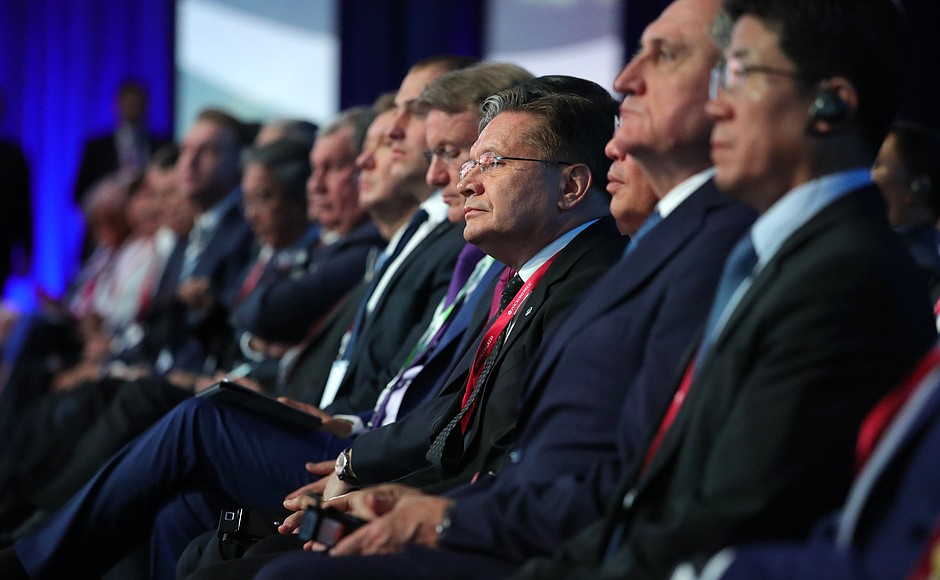
This is required primarily to make significant improvements to the quality of life of our citizens, to ensure that in the next few years more people relocate to the Far East from other regions, than the number of people leaving. Our ambition must be to ensure that more and more citizens live, work and build their homes, start their families and raise their children here in the Far East.
What are the key spheres that should be covered by the national development programme for the Far East?
First and foremost, we must ensure a high, advanced dynamic in such sensitive fields as quality housing, utilities, transport accessibility, connectivity of the Far East with the rest of Russia, healthcare, culture and availability of sports facilities. We must have special measures in place to help boost demographic development and support families.
Second. The future of the Far East does not only comprise traditional areas that we must also bring to a new level. Above all, these are such fields as education, science and international cooperation in the industries that are definitive for global progress.
We are meeting here on Russky Island at the Far Eastern Federal University where we intend to start a world-class education and research centre and develop it further. This includes, of course, construction of a technology park and a mega-science research installation that will allow solving completely new fundamental science and applied science tasks in pharmaceuticals, materials science and other spheres.
I believe our major companies and corporations involved in Far Eastern projects, such as Rosneft, Gazprom, Rosatom and Roscosmos, aviation industry companies and others should build their engineering facilities, research and development centres on Russky Island. The Government and the top management of these corporations should consider this as direct instructions.
Today, it is not uncommon for new technology to outpace deeply rooted legal regulation and certification norms. We want to remove these barriers. What we want is for Russia’s Far East to be a space of the future, of a dream, and a place of creativity, if I may say so.
I instruct the Government to devise a special status for Russky Island. It must offer an enabling environment so that any research team or any group of enthusiasts can launch start-ups, make their ideas a reality and engage in innovative projects. In this environment they must be able to test the most advanced solutions before their practical or commercial use makes its way into laws, including in robotics, unmanned and sea transport, healthcare, biotechnology and the environment.
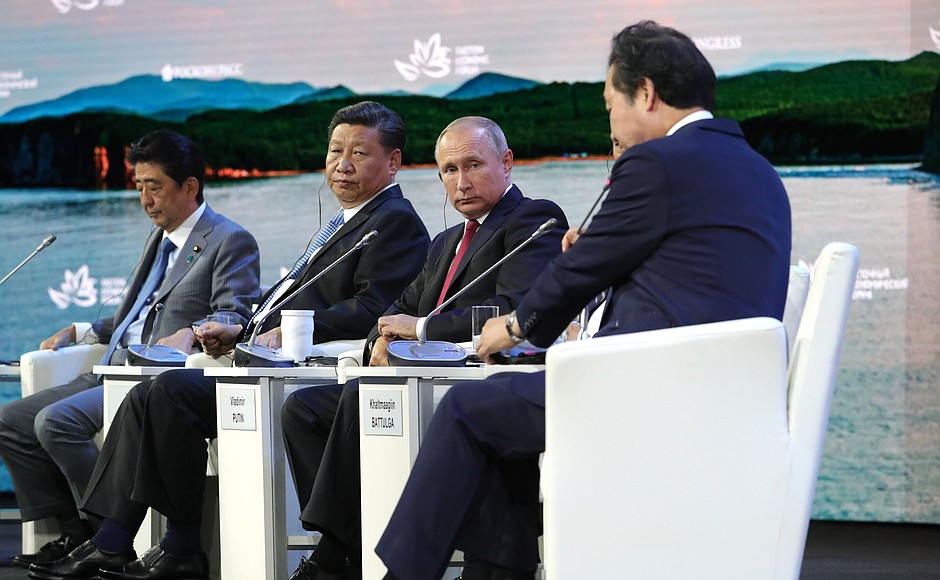
In addition to this, I propose establishing a Digital Development Centre on Russky Island as part of our programme to promote a digital economy. This centre could focus on software development, big data storage and transmission, as well as cyber security, and other spheres.
Two months ago now, a unique and innovative training course on digital technology was held at the Far Eastern Federal University as part of our national technology initiative. The educational process in its entirety was designed and planned using artificial intelligence, from the selection of participants to mapping out individual educational trajectories.
Following up on this experiment, the Far Eastern Federal University has now launched a management course for the digital economy. We will ensure that other regions and universities across the country adopt these practices.
Of course, Russia’s Far East must become a platform for introducing new cutting-edge digital solutions in transport, housing and the utilities, education and healthcare, as well as in government services.
For example, businesses can already receive essential services online, including receiving construction permits, setting up companies within priority development areas, registering land titles and obtaining licenses.
Third. I am confident that the Far East can and should become a powerful economic and industrial centre with a high export potential, but this cannot be achieved without entrepreneurial energy and the growth of small and medium-sized businesses.
The business climate in the Far East should be competitive with other Russian regions and neighbouring countries. But, to be attractive to our neighbours, and the Russian part of the audience understands this perfectly, we need to go one step ahead.
This year, four out of nine Far Eastern regions made it to the Top 40 of the national investment climate ranking. This is a good dynamic, but there is still a lot to be done.
As for federal support, a number of additional solutions have already been adopted. Until the end of 2025, investors in the areas of advanced development and the free port of Vladivostok are entitled to apply for a 10-year grace period on their insurance premiums. Please note – I am calling on those engaged in business – this will be for 10 years. It is for them that the so-called grandfather clause has been added, that is, investors have thus received guarantees of unchanged conditions for the implementation of their projects.
To support both Russian and foreign business leaders, to provide them with soft-term financing, we plan to add more than 8 billion rubles to the Far East Development Fund this year. I also ask the Government to decide on the capitalisation of the Fund for the next three years.
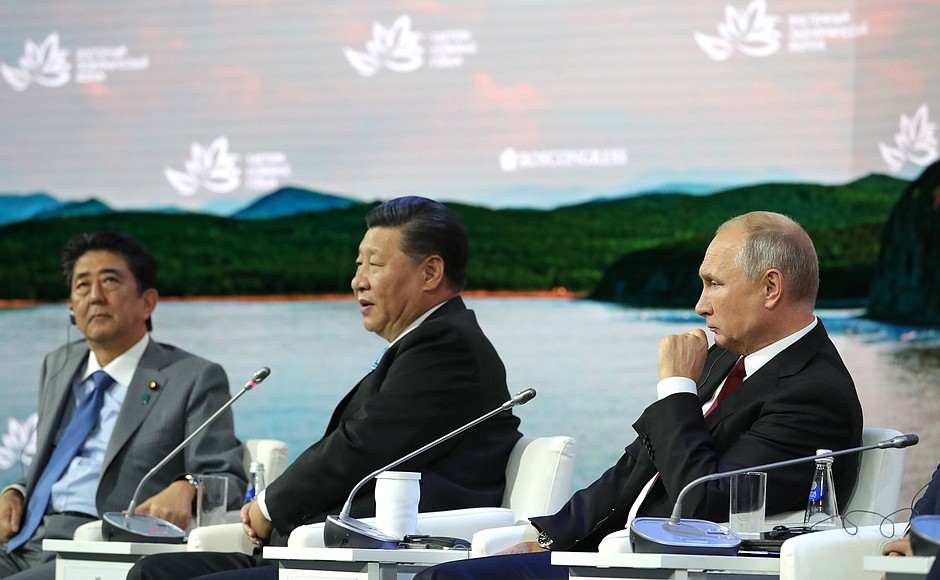
Fourth. The Far East should fully attain its logistic potential. The large-scale modernisation of the BAM Railway and the Trans-Siberian Railway, the development of the Far Eastern ports and the Northern Sea Route will dramatically increase the transport connectivity of the APR and Europe. In the coming years, we will need to modernise border crossings in the Far East, and make the customs, control, checkpoint and other border services more convenient for individuals and businesses.
Allow me to remind you that in the next six years, the volume of container traffic by rail should increase fourfold, and the shipping time from the Far East to the western border of Russia will be cut to seven days. Traffic along the Northern Sea Route should grow to 80 million tonnes per year.
Once again, these are all worked-out and feasible plans, all the more so since such an infrastructure generates obvious interest and business demand. Right now, the first ice-class container ship the Arctic 4 is moving along the Northern Sea Route – the shortest sea route between the Far East and Europe.
This voyage from Vladivostok to St Petersburg (with an initial visit to the Korean port of Busan and then on to Bremerhaven in Germany), without exaggeration, opens up a new page in the history of commercial navigation, and confirms the safety, efficiency and relevance of the Russian Arctic and the entire Northern Sea Route as an international corridor.
We invite interested partners to develop this promising transport artery. And we already know that such projects are of great interest to our partners.
And another thing. It is obvious that the profits and benefits from transit corridors should not forego the Far Eastern regions and the people living here. Modern transport and export infrastructure should become a framework for creating high-quality jobs, new industries and enterprises, producing high-value-added products in the Far East, including, and perhaps above all, export-oriented products.
This is extremely important. It is certainly important to create export-oriented transport corridors, but it is even more important to develop our own economy and our own production.
The main users of the Far Eastern transport routes, the ports, as a rule, are large coal and energy companies. I suggest thinking about ways to encourage these Russian exporters to channel part of their revenues into effective economic and social projects in the Far East.
Friends and colleagues,
Russia and our Far East are certainly open to expanding business ties. We are confident that there is an obvious mutual benefit here. And it is not just about profit in financial reports. Joint projects in industry and science, education and culture, infrastructure and energy serve to bring countries and peoples closer together, to better understand, to know each other, to strengthen our common heritage – peace, neighbourly relations and trust in the dynamic and complex 21st century, where we pool efforts and potential to create the future.
I wish you all success and wellbeing. Thank you for your interest in the work of today's forum.
Thank you.
<…>
Vladimir Putin: (answering a question on Mongolia’s proposals on infrastructure and the electricity sector) We have just discussed these proposals with my colleague, the President of Mongolia, at a bilateral meeting. We know them, we are working on them, and overall, they are quite feasible.
You know, we have been working in Mongolia for quite some time now. Speaking of the country’s transport infrastructure, Russia owns 50 percent of the Ulaanbaatar Railway, and partners on both sides have good plans to develop its infrastructure. We discussed with our Chinese, as well as with our Mongolian friends possible delivery routes for supplying hydrocarbons through Mongolia. There are also other questions and proposals concerning the energy sector that deserve our support. All this is work in progress.
<…>
Moderator of the Eastern Economic Forum’s plenary session Sergei Brilyov: Mr President, what I am going to say now is probably the scariest thing I have ever said, since it might seem as though I am pretending to walk in your shoes. This is what I have been thinking: remember, back in 1956, the Moscow Declaration, the expression of good will, the idea of two islands, and a possible path toward a peace treaty. However, after that the situation shifted away from the good will. Specifically, one of the apparently negative developments was the stationing of US troops on Japanese islands, including offensive forces.
Since you have touched upon this subject during the talks, I would like to ask the following question, if I may: what if US troops are deployed on what we regard today as Russia’s Southern Kuril Islands, since they have an absolutely critical location in terms of accessing the Pacific Ocean? Is this aspect part of the negotiations or not?
Vladimir Putin: Allow me to begin by saying that Shinzo is right: both he and I are eager to sign a peace treaty. I believe this to be extremely important for the relations between our countries. It would also be a very positive development for the world in general, as President Xi Jinping just pointed out. We need to ensure favourable conditions in the region. I totally subscribe to this idea. Japan is a natural partner for Russia, and we do not want our relations to be constrained by anything.
Security matters are very important, and we discuss them, including from the perspective that you have mentioned. Of course, there are many aspects related to military cooperation in the region that are a matter of concern for us, including the deployment of US missile defence systems. We discuss all these questions as part of the negotiating process.
I do not want to go into detail, I would like to proceed from what Shinzo said, and it was he who suggested changing our approaches. You will not believe this, but I will tell you honestly that such a simple thought dawned on me right here and now. We have been trying to resolve contentious issues for 70 years. You have mentioned the 1956 declaration. Not only was it signed, but it was also ratified by the Diet (Parliament) of Japan and the USSR Supreme Soviet. The Japanese side later refused to honour this declaration. We are now reexamining these issues.
We have been in talks for 70 years. Shinzo suggested changing approaches. Therefore, it has dawned on me that we should sign a peace treaty, not now, but before the year is out, and without any preconditions. (Applause.) I did not even ask the audience to support me by applauding. Thank you for this support.
As friends, we would continue to address all contentious issues in line with this peace treaty. To my mind, this would certainly make it easier for us to resolve all the problems that we have been unable to cope with for 70 years.
<…>
Sergei Brilyov: In the past three to four days, at least two theories have been advanced as to what happened to those two young men, photographed in the United Kingdom in connection with the “Skripal case.” Either they deliberately poked their faces towards the camera in order to be photographed, or they are completely unprofessional to have their images captured by all the cameras. Perhaps you have a third theory?
Vladimir Putin: Actually, we have, of course, taken a look at these people. We already know who they are, and we have located them. I hope they will show up and tell everyone about themselves. This would be better for everyone. I assure you that there is nothing special or criminal here. We will see shortly.
Sergei Brilyov: Are they civilians?
Vladimir Putin: Of course, they are civilians.
Sergei Brilyov: All right, we will wait.
Vladimir Putin: I would like to address them, so they can hear us today. Let them come to a media outlet and tell everything.
<…>
Sergei Brilyov: Mr President, the Chinese supplied an aircraft to the North Koreans [for Kim Jong-un's flight to Singapore], maybe even put an umbrella in it, but obviously not a nuclear one. Would Russia be willing to provide a “nuclear umbrella” to North Korea?
Vladimir Putin: China has a “nuclear umbrella”, so China feels confident enough in this sense. Nevertheless, I fully agree with what was just said by President Xi Jinping, as well as with what Prime Minister of Japan Shinzo Abe said.
Indeed, President Trump has shown, as he said, an innovative approach to dealing with North Korea. I agree, this actually shows a certain amount of courage and an innovative approach, all right. But after all, North Korea was promised security guarantees in exchange for its denuclearisation efforts, as you have just pointed out.
North Korea has taken certain steps to denuclearise – it blew up its nuclear test site, destroyed it, but it apparently expects something in return. And it seems counterproductive if North Korea is required to do so much while the other side does nothing at all. It sounds like North Korea has to take their word for it that in the long run it will benefit.
What guarantees could be offered? International guarantees. We have the format of six-party talks. And the international community can give such guarantees, including those secured by the presence of nuclear powers in these agreements. China and Russia are parties to these talks.
If North Korea is satisfied with US guarantees alone, that is also fine with us, but it is probably unlikely to happen, we have to be realistic. It seems to me that international guarantees would be more relevant in this case, and we can talk about it.
Sergei Brilyov: We already had six- party talks on Iran, and we know the position of President Trump on this. As for his recent meeting with Kim Jong-un, isn’t this a threat that, if the Americans handle the negotiations with North Korea on their own, everything would end in much the same way as it did with Iran – all agreed, but the agreements collapsed?
Vladimir Putin: You know, the Iran agreements were actually largely negotiated between the Americans and the Iranians. We only accompanied them, to be honest about the whole story, we only supported that process. The decision relied on their agreements anyway. Therefore, such threats are always out there, but this does not mean we should not do anything and should not move forward.
<…>
Vladimir Putin: I spoke about President Trump’s actions without any skepticism or irony. I really think it is an innovative approach, and that he showed courage, political courage.
If North Korea makes efforts for its denuclearisation, it expects something in return, not just endless demands of complete disarmament before even deciding how its security will be defended. That is all. This is simple formal logic.
Sergei Brilyov: [Federation Council Speaker] Valentina Matviyenko visited Pyongyang and conveyed your personal message to Kim Jong Un, Mr President. Are we expecting him here?
Vladimir Putin: We are inviting him. He can visit any time that is convenient for him.
<…>
Sergei Brilev: I am talking about a serious matter, transactions in national currencies. It is a popular idea but last week during the Moscow Financial Forum, Alexei Kudrin expressed certain scepticism because, as he believes, it would be an additional burden on businesses, at least based on the current regulations.
Do you think the transition to trading in national currencies is realistic?
Vladimir Putin: Allow me to say a few words about infrastructure. It is a very important matter.
First, we fully support President Xi Jinping’s idea regarding linking the infrastructure development ideas, the One Belt One Road cooperation and our integration within the EAEU.
We are already negotiating with many countries within the EAEU. We signed a free trade zone agreement with Vietnam in Asia and are now negotiating with Singapore. We signed a non-preferential cooperation agreement with China. The agreement covers customs procedures, protection of intellectual property and e-commerce. All this is progressing.
Look, yesterday (this is the latest example, also covered in the media) the famous Alibaba signed cooperation agreements with Russia’s Mail.Ru, MegaFon and the Russian Direct Investment Fund. We expect that it will be a serious contribution to the development of e-commerce. Here we are also linking the China-proposed One Belt One Road initiative and our EAEU efforts, this time in e-commerce.
As concerns the infrastructure, it is just as important to us. I have already spoken about this many times and mentioned today the development of the Trans-Siberian Railway Network and the Baikal–Amur Mainline. In order to develop the Trans-Siberian Railway Network – and it does need to be done, we are doing it and we will be doing it, the question is, what is the scope of this work? Do we need to build more tunnels like, for example, the Severomuisky Tunnel? It would be good, of course. This will significantly expand our opportunities to transport cargo but it should not be only coal. What if the coal industry caves in in the world? We need to guarantee the volume of container shipments. Therefore, we need to cooperate with China, Japan, South Korea and with Mongolia.
You asked me about a bridge to Sakhalin. Yes, this will significantly increase the potential of the Sakhalin ports. But we need to understand the scope of cargo operations. Therefore, it is extremely important to build cooperation with the countries in the region. Our economic decisions on the amount of investment into our own infrastructure depend on this. These are not just idle meetings and idle talk.
Settlement in national currencies. Of course, all experts understand that we must proceed step by step. And this is how we will proceed. Today the ruble and the yuan are traded at the Moscow Exchange. Some goods are more often traded in USD, especially homogeneous goods of the hydrocarbon group such as oil and gas.
For example, the ruble is being actively used to settle with the CIS and EAEU countries: I believe 71 percent of export revenue is in rubles, as well as 79 percent of import earnings.
Given the situation we have to face when settling in USD, more and more countries want to trade in national currencies. There are limitations. What Alexei Kudrin spoke about primarily concerns trade in oil, petroleum products and gas. But developing bilateral trade in national currencies is also right. It is right from the position of sustainability of global finances and the global economy. We will proceed step by step.
Sergei Brilyov: Does the Central Bank of Russia have a political task to sign agreements with the corresponding central banks in other countries to transfer trade to national currencies? Or should this be its own initiative?
Vladimir Putin: This is not a political task but an economic one.
<…>
Sergei Brilyov: And about tugriks…
Vladimir Putin: We can deal in tugriks too. This concerns the settlement day and the exchange rate: how this issue should be resolved, first at the level of central banks. These mechanisms are being tested. Are there risks? Yes, there are risks everywhere. Are there no risks with the USD? The United States’ national debt is $20 trillion. This entire burden falls on the USD, by the way. What will happen next? Nobody knows; there is no answer.
There are risks everywhere and they must be minimised. What should we do to minimise them? We should diversify our payments and activities.
For example, we diversify our foreign-exchange reserves, as we do the national debt of the Russian Federation, which is nominated not only in USD but in other currencies as well. All this is important. I believe it provides for the sustainability of our financial system and the entire global financial system, as well.
<…>
Sergei Brilyov: Can the resolution of territorial disputes be viewed as a possible prerequisite for larger economic prosperity, freedoms, etc.?
Vladimir Putin: The President of Mongolia has just said that they also had territorial disputes, including with China, but were able to come to an agreement. The same happened with us. Strange as it may seem, Russia had territorial disputes with the People’s Republic of China. Talks on this matter took 40 years, but in the end, we were able to find acceptable compromises and resolved these problems.
Moreover, allow me to inform you that Russian and Chinese businesses now even propose that we work together on making full use of the opportunities offered by these islands.
Sergei Brilyov: Are you referring to the islands near Khabarovsk?
Vladimir Putin: Yes, they propose stepping up activity there, including both infrastructure development and tourism.
Sergei Brilyov: On the islands that have been handed over?
Vladimir Putin: Yes. This goes to say that not only did we find what I hope is a permanent solution to this problem, but there are also proposals to work together. For this reason, I do believe that we will be able to resolve other similar matters, including with Japan.
I was not joking when I mentioned signing a treaty without preconditions. We can state right there in the treaty that we will seek to settle all issues, and I have no doubt that the day will come when we will. We need to remove all the barriers that stand in the way of our relations.
If this does not work, Prime Minister Abe and I agreed to work together on promoting joint economic activity on the islands. We need to create a favourable environment for dealing with these questions. After all, I believe that these are secondary matters with no significant impact on the national economy.
Just take a good look at the map of the Russian Federation. This country is so huge, actually the biggest in the world. And here are these islands. These questions have to do with ethics and politics rather than anything else, although this does not make them less urgent or sensitive for our people. For this reason, I would like to reassure you that we need to be cautious when dealing with various approaches.
We will seek to provide favourable conditions for resolving these issues. We want to resolve them, and I hope that one day this will happen.
Sergei Brilyov: And the last thing, Mr President. You have now spoken about the situation, so I would like to touch upon – maybe, of course, it is not the President's concern – visas, and yet, you mentioned this word today and in recent days as well.
After all, the sky did not fall down during the FIFA World Cup when Russia significantly simplified visa formalities. Why not continue this? I can even cite one technically curious story.
Speaking about the APEC countries, we have visa-free travel with nearly all Latin American states, save Mexico, although Mexican fans were the most prominent. Russians can travel to Mexico as electronic visas are available there, but Mexicans are required to get full-format visas in order to enter our country, except during the World Cup. Perhaps, we should review our visa system. People complain about US visas and Schengen visas, but believe me, I think even your acquaintances find it hard and inconvenient to get a Russian visa, businessmen in particular.
Vladimir Putin: I am all in favour, but Lavrov is against it. He is sitting over there. And I have to heed specialists' opinions. As the Foreign Ministry staff insists, such matters are mainly solved on the basis on reciprocity. For now, we will retain the existing format of dealing with these matters, but we will doubtless strive towards lifting all visa barriers.
And for Shinzo, of course, if he has to obtain a visa each time, we will grant him a five-year or ten-year visa. Let him travel.